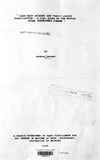| dc.contributor.author | Rakama, Brenda | |
| dc.date.accessioned | 2016-05-21T07:05:20Z | |
| dc.date.available | 2016-05-21T07:05:20Z | |
| dc.date.issued | 1996 | |
| dc.identifier.uri | http://hdl.handle.net/11295/95811 | |
| dc.description.abstract | In this study it was hypothesized that the introduction of a cash crop in a well established subsistence economy was likely to alter the household labour organization and use. The study centered on the simple theme of family labour use viz a viz the emergence of a cash economy characterized by sugarcane growing in the Mumias Sugar Outgrowers Scheme.
The Mumias Sugar Outgrowers Scheme area includes parts of Bungoma, Busia and Kakamega Districts in the Western Province of Kenya.
The Outgrowers Scheme comprises individual smallholder farmers who have signed contracts with the Mumias Sugar Company for the supply of sugarcane to the factory. Mumias area comprised predominantly a peasant economy before the introduction of the scheme.
The study traces the ripple effects that a simple decision such as growing sugarcane or not can have. It reflects the outcome of contradictions between old and new ideas superimposed on a social and economic structure that is ill equipped to undertake new developments. Th° imbalances emanating from the disrupted status
}uo reflect the intricacies generated by simple everyday happenings in outgrowers parcels of land. The Outgrowers largely succumb to the pressure on land and labour, two very crucial facets of a peasant economy.
Cultural factors affecting the division of labour have only exacerbated the domination by cane growing to the extent that the women, who are traditionally responsible for food crop/subsistence production are burdened even further. The minimal concentration on subsistence production affects the life of the outgrowers as a whole.
The quantities, quality and variety of food production suffer at the hands of the new economy. Food deficiencies, unequal exchange and event-ually underdevelopment, the very factors targeted at the outset of t He scheme become prominent features.
The study's theoretical orientation focusses on the whole question of capitalist growth and its effects on the other modes of production that precede it. The trend of development through such processes as industrialization and progression through agribusiness and multinational corporations is resisted. The Mumias Sugar Outgrowers Scheme is used as a case study.
The data was collected primarily through survey interviewing and complemented by observation, key informant interviews and
(ii i)
review of available records.
The study concludes that the mode of development a community is linked to must not only reflect on the economic factors and benefits anticipated by its initiation but there must also be recognition and consideration of the social dynamics that are likely to be sparked off by the events. The social effects may eventually render economic growth ineffective in real terms.
Several recommendations are submitted as remedial measures in so far as correcting the imbalances registered in the production processes are concerned. The recommendations underline the need to approach rural development planning with a fuller knowledge of the internal dynamics of peasant production in an exchange economy where foreign capital influences the production and therefore the consumption patterns of the peasant outgrowers. | en_US |
| dc.language.iso | en | en_US |
| dc.publisher | University of Nairobi | en_US |
| dc.rights | Attribution-NonCommercial-NoDerivs 3.0 United States | * |
| dc.rights.uri | http://creativecommons.org/licenses/by-nc-nd/3.0/us/ | * |
| dc.subject | Cash Crop Economy and Family Labour Organization | en_US |
| dc.title | Cash Crop Economy and Family Labour Organization - a Case Study of the Mumias Sugar Outgrowers Scheme | en_US |
| dc.type | Thesis | en_US |



